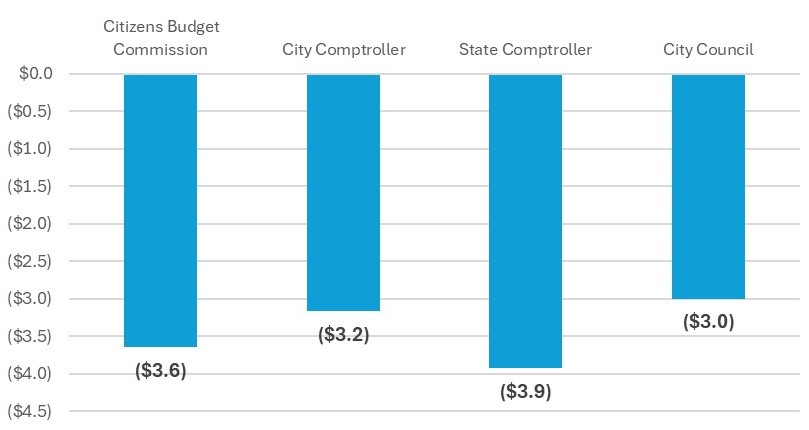CBC Releases "Real Numbers, Real Choices"
CBC’s Real Numbers, Real Choices report reveals that New York City’s future fiscal picture is clouded by alarmingly understated spending estimates and revenue projections that may be too conservative. Reasonable estimates are critical to making smart decisions and are legally required.
While the numbers may be clouded, the reality of future problems is clear. Outyear budget gaps may exceed $8 billion according to multiple fiscal monitors, even without expanded programs and risks. Adding in potential costs of implementing the State class size reduction mandate, expansion of the FHEPS housing voucher program, potential future costs for services for asylum seekers and migrants could possibly balloon the fiscal year 2028 gap beyond $17 billion.
Real Numbers, Real Choices details that the Mayor’s Executive Budget—due next week—should give a more accurate picture of the City’s fiscal standing to foster budget choices that stabilize the fiscal future. Making budget decisions based on unrealistic estimates increases the chances of a future fiscal reckoning.
CBC, the State and City Comptrollers, and the City Council each estimated the City’s financial plan for fiscal year 2025 underbudgets the cost of continuing current programs between $3.0 billion and $3.9 billion.
FY25 Underspending Estimates* between $3.0 Billion and $3.9 Billion

Always difficult, projecting tax revenues coming out of the pandemic has been extremely challenging. While basing the budget on reasonably conservative revenue estimates helps ensure stability and protects against recessions, OMB’s significant upward revisions and others’ estimates suggest the City’s projections may have been too conservative.
To sharpen the City’s fiscal view and give the clarity that promotes long-term fiscal stability, CBC strongly urges the Mayor and City Council to:
- Include reasonable estimates of costs of all planned programs in the budget. It is what is legally required, what the people deserve and expect;
- Provide accurate, but reasonably conservative revenue estimates;
- Allocate funded vacancies to where they are most needed to provide critical services;
- Allow agencies to hire into funded positions and spend their budgets on needed programs, overly strict and blunt controls can weaken services;
- Reduce future budget gaps by prioritizing spending to fund what is needed and proven to work;
- Implement additional savings plans, focused on increasing productivity and shrinking lower impact and priority programs; and
- Put extra funds available now into the Rainy Day Fund and commit to saving it for a recession or severe, one-time emergency.
* Note: Underspending estimates have been adjusted to ensure comparability. Please see report for detail. City Council estimate does not include proposed spending of $1.6 billion in fiscal year 2025. City Council and State Comptroller estimates do not include offsetting underspending. All estimates exclude class size reduction mandate, CityFHEPS expansion, and asylum seeker cost re-estimates.